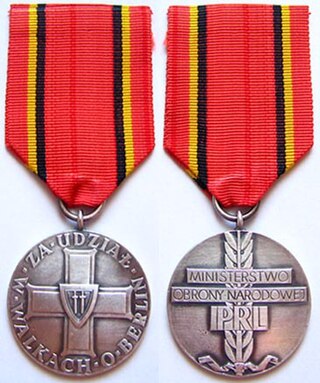Related Research Articles

Leszek Marek Długosz was a Polish actor, poet, writer and composer. For many years he was a member of cabaret "Piwnica pod Baranami", one of the most famous cabarets during the times of People's Republic of Poland.

Karol Semik is a Polish teacher and educator. Since 2008 the Superintendent.

Alicja Majewska is a Polish singer. From 1971 to 1974, she was a member of the band Partita as vocalist. In 1975, she received the main award at the National Festival of Polish Song in Opole. She was awarded a Grand Prix at the 1980 festival in Rostock, and was honored in Havana (1985). She received the "Gloria Artis" medal.
The Decoration of Honour for Officers and Other Ranks for Wounds and Injuries – a Polish military award, established by the Council of National Defense on July 14, 1920, at the peak of the Polish–Soviet War and awarded to any military, irrespective of rank or branch of service for a wound or injury sustained in action against an enemy in defence of the country.

BNP Paribas Bank Polska is a Polish bank, originally founded in 1975 as Bank Gospodarki Żywnościowej (BGŻ). It has been owned by BNP Paribas since 2015, and adopted its brand name in 2019.

Wacław Waldemar Michalski is a Polish poet, librarian, editor, curator and critic.

The Decoration of Honor Meritorious for Polish Culture or Meritorious for Polish Culture, is a Polish departmental decoration in Arts awarded by the Ministry of Culture and National Heritage of the Republic of Poland to persons and organizations for distinguished contributions to the Polish culture and heritage. This award was instituted on 11 August 1969.

Piotr Paweł Morta is a Polish political activist, dissident, economist, co-inventor, activist in underground "Solidarity", Krajowy Mistrz Racjonalizacji 1983, and vice-chairman of European Works Council Pfleiderer AG.

Alfred Juliusz Świerkosz was a Polish journalist, photographer and an author of first monographs in Polish about cities of Pomerelia.

Grzegorz Seweryn Kaliciak is a Colonel of Polish Armed Forces.

Marian Turski is a Polish historian, journalist and Holocaust survivor who served as the editor-in-chief of Sztandar Młodych, a nationwide daily newspaper of the Union of Polish Youth in 1956–1957 and from 1958 onwards, a columnist for the moderately critical weekly Polityka as the head of the weekly's historical department.

Jan Krenz was a Polish composer and orchestra conductor.

Stefan Wolski was a prose writer and poet, lawyer, and participant in Lublin's literary life.

The Medal for Warsaw 1939–1945 was a Polish commemorative medal awarded by the Polish People's Republic to commemorate active participation in defending Warsaw in 1939, 1944 Warsaw Uprising, and in liberation of Warsaw from Nazi Germany in January 1945.

The Medal for Oder, Neisse and Baltic was a Polish commemorative medal awarded by the Polish People's Republic to commemorate those who directly participated in combat against the Nazi Germany for the liberation of Poland and the restoration of its old boundaries on the rivers the Oder, the Neisse and the coast of Baltic Sea.

The Medal for Participation in the Battle of Berlin was a Polish commemorative medal awarded by the Polish People's Republic to commemorate Polish military personnel who took part in the Battle of Berlin.
Stanisław Prutis is a Polish jurist, professor of law, Voivode of Białystok Voivodeship (1990–1994), dean of the Faculty of Law of the University of Białystok (1996–2005), full professor at the University of Białystok.

Franciszka Cegielska was a politician, government official and engineer. She was the Minister of Health of Poland from 1999 to 2000. Additionally, she was also a member of Sejm of Poland from 1997 to 2000, a member and chairporson of the Pomeranian Voivodeship Sejmik from 1998 to 1999, and the mayor of Gdynia from 1990 to 1998.
Draginja Nadażdin is a Serbian-Polish activist for human rights, and was the director of Amnesty International Poland (2007–2021).